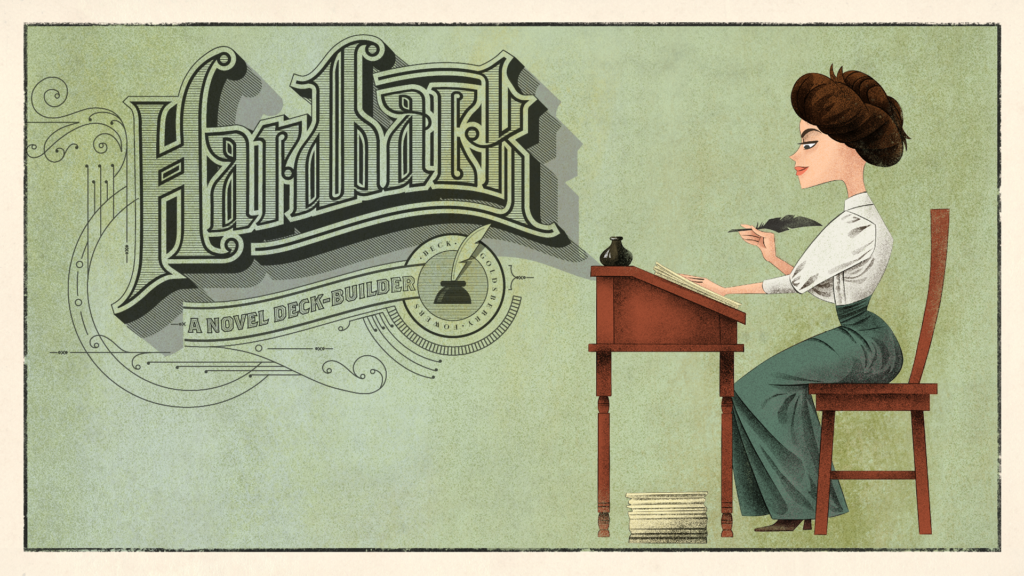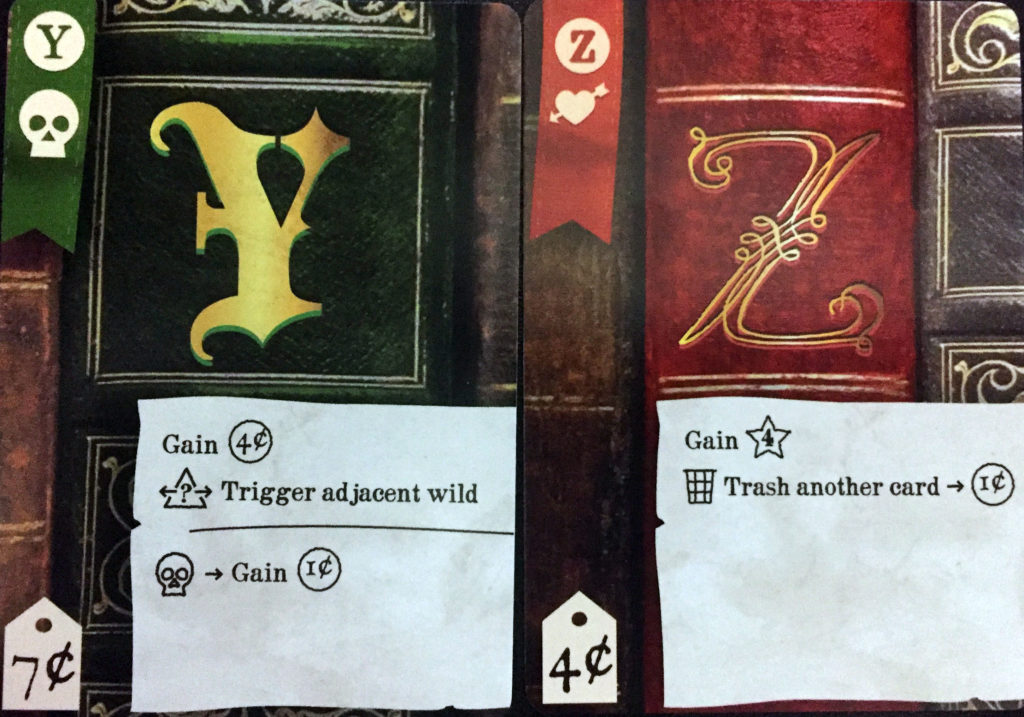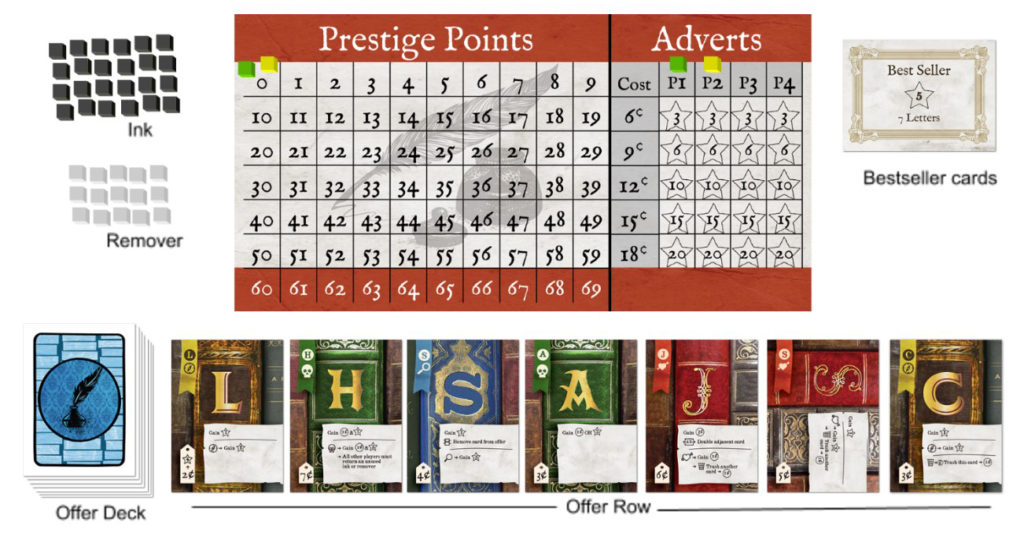I liked “Paperback” (by Timothy Fowers from Fowers Games) so much that I gave it a 9/10, observing that it “combines the ideas of spelling words for points and deck building rather nicely”. I also enjoyed my time with “Word Domination” (by Jeff Beck from Uproarious Games), which I previewed for a Kickstarter campaign back in August of 2016. Back then, I claimed that it was “truly a step up from the word games in my collection” and I maintain that praise. Enter “Hardback”, a game that both gentlemen are working on that is similar to the aforementioned “Paperback” in a number of ways (which is a good thing). “Hardback” will be seeking funding through the Kickstarter process starting April 4th, 2017. As such, the game copy I received was a prototype and thus, everything seen here (including the rules) are subject to change.

Like “Paperback”, “Hardback” is a deck-builder with a focus on the alphabet and English language. “Paperback” tasked players with creating words with letter cards, some of which had special abilities that I found to be really neat. “Hardback” is similar in that you’re using letter cards and as a 19th century aspiring novelist, you’re paid per word. Jeff described the game to me as a “pre-quill” (get it kids, because quills are…oh nevermind) in theme and I certainly felt his claims to be justified. While there are obvious differences (which I’ll get to), I liked how certain letters represented different genres (adventure, romance, etc.). While cards by themselves have abilities, using two of the same genre enables an extra ability (like in “Star Realms”).
Like most deck-builders, players begin with a pre-built but small deck of cards in which to build upon. Specifically, eight one-cent cards consisting of A, E, I, L, N, R, S, and T along with two random starting prestige cards that consist of C, D, G, H, M, O, P, and U. Any unused ones go back into the box. The ink and remover cubes (black and white respectively) are placed within easy reach of all players. There are also best seller cards which you’ll want to order from 7-12. There’s more to the setup process like setting up the prestige and adverts tracker along with the need to form a starting pool of purchasable cards but I’ll opt to jump into gameplay to give you an idea as to what you’re getting into should you decide to support the game.
Players start with a hand of five cards from their deck. On their turn, they’ll first attempt to form a word using as many letters as possible as the entire hand will be discarded into their discard pile when they’re done. Players familiar with deck-builders know this to be standard. Anywho, any card can be played face-down so that it turns into a wild, but you won’t be able to use its ability nor will you earn money for it. If persistent cards are in play, you can build off of those as well. When using other players’ persistent cards you won’t be able to use their ability, but the cards will be forced to be discarded.

Cards provide a number of benefits, but they mainly come in coins, prestige, and abilities. Coins are used to buy new cards from the central pool on your turn to add to your discard pile at the turn’s end. The discard pile becomes the new deck once you’re out of cards to draw, so you’ll be seeing your purchases later in the game. Prestige act like victory points and the player with the most at the end of the game wins. As mentioned above, there’s a tracker for that. Abilities are either basic or genre…meaning that you can always use the card’s basic ability when played, but you only gain the benefit of the genre ability when you play another card of the same genre on the same turn to form your word.
In addition to purchasing cards, players can purchase ink tokens which are used to push your luck. Ink tokens can be spent at ANY time which allow you to draw one card face-up in front of you. The ink token used to draw a card is placed on the card as a reminder. On your next turn, you MUST use ALL the cards in front of you with an ink token, hence the push your luck mechanic. Ink tokens are the only way to get additional cards on your turn to form longer words and you may want to in order to claim those best seller card bonuses. If you form a word using a number of letters that matches the top best seller card (starts with 7), you get to claim it. Ink remover tokens remove ink tokens, allowing you to add the card to your hand.
The first player to sixty prestige wins. It’s important to note that I didn’t cover all of the rules in the prototype manual. For example, you can buy adverts (on the tracker) to gain prestige points. Hopefully though this overview will give you a brief taste with which to whet your appetite. My knowledge of “Star Realms” served me well here, as I choose to specialize in one or sometimes two genres to increase the chances of two cards of the same genre being drawn from my deck every turn. Of course, you’re free to collect whatever letter cards you want…this game is all about making those tough decisions. “Do I collect this unpopular letter to build upon the genre I’m going for, or do I take this other letter that can be used in a lot more words?” I found myself asking that question a lot.

As deck-builders go, this one was incredibly fun. Word games are beneficial already for their educational value…but seriously, anyone can get behind this one even if you aren’t the world’s best speller. I found it to be a great mish-mash of different genres and felt that the deck-building, word spelling, and push-your-luck mechanics worked well together. I’ll be keeping my eye on this one and can’t wait to see what the final product looks like.
—
Kickstarter: https://www.kickstarter.com/projects/fowers/hardback-the-pre-quill-to-paperback?token=a62d6118
